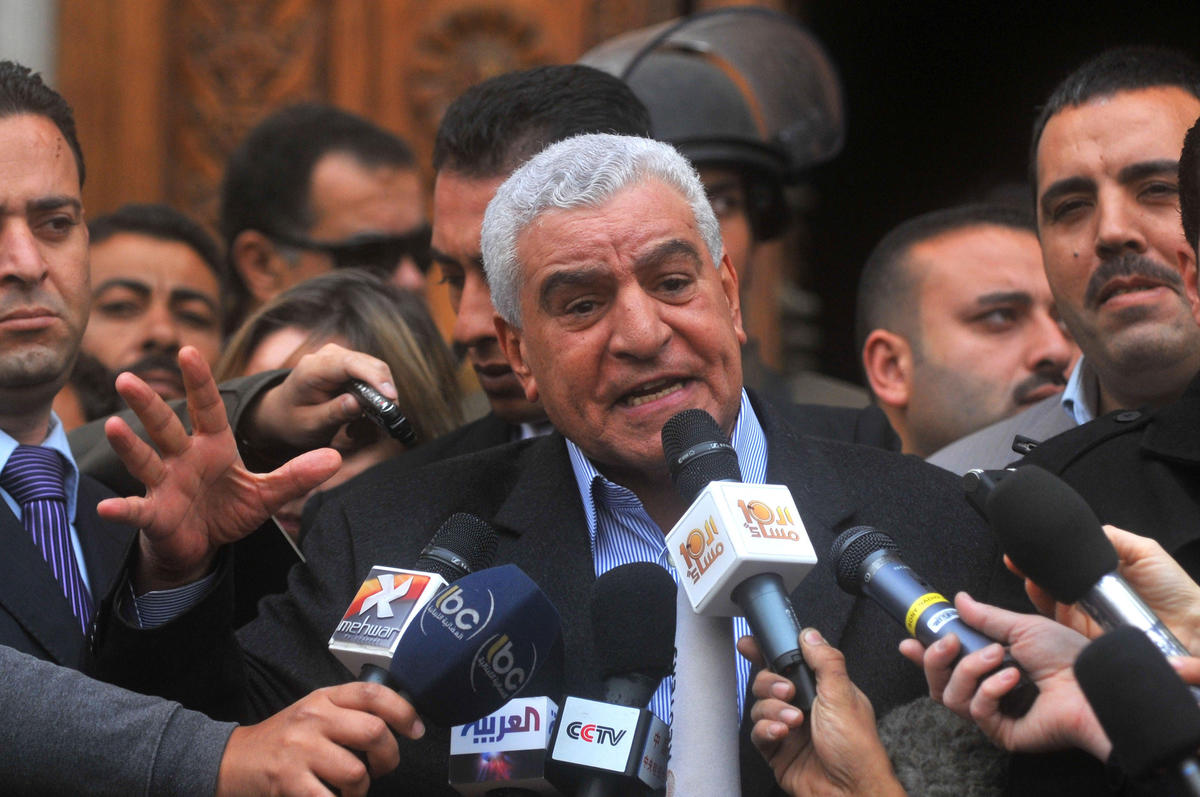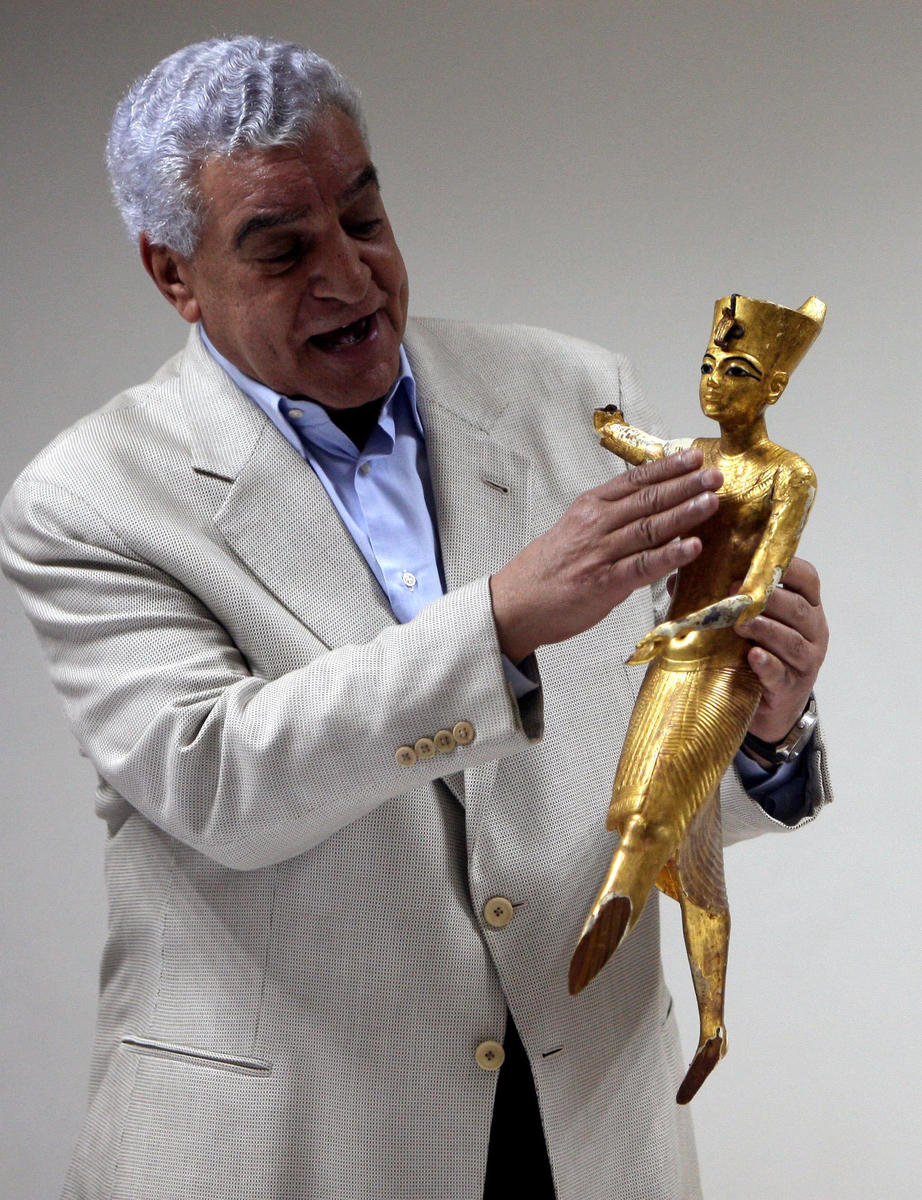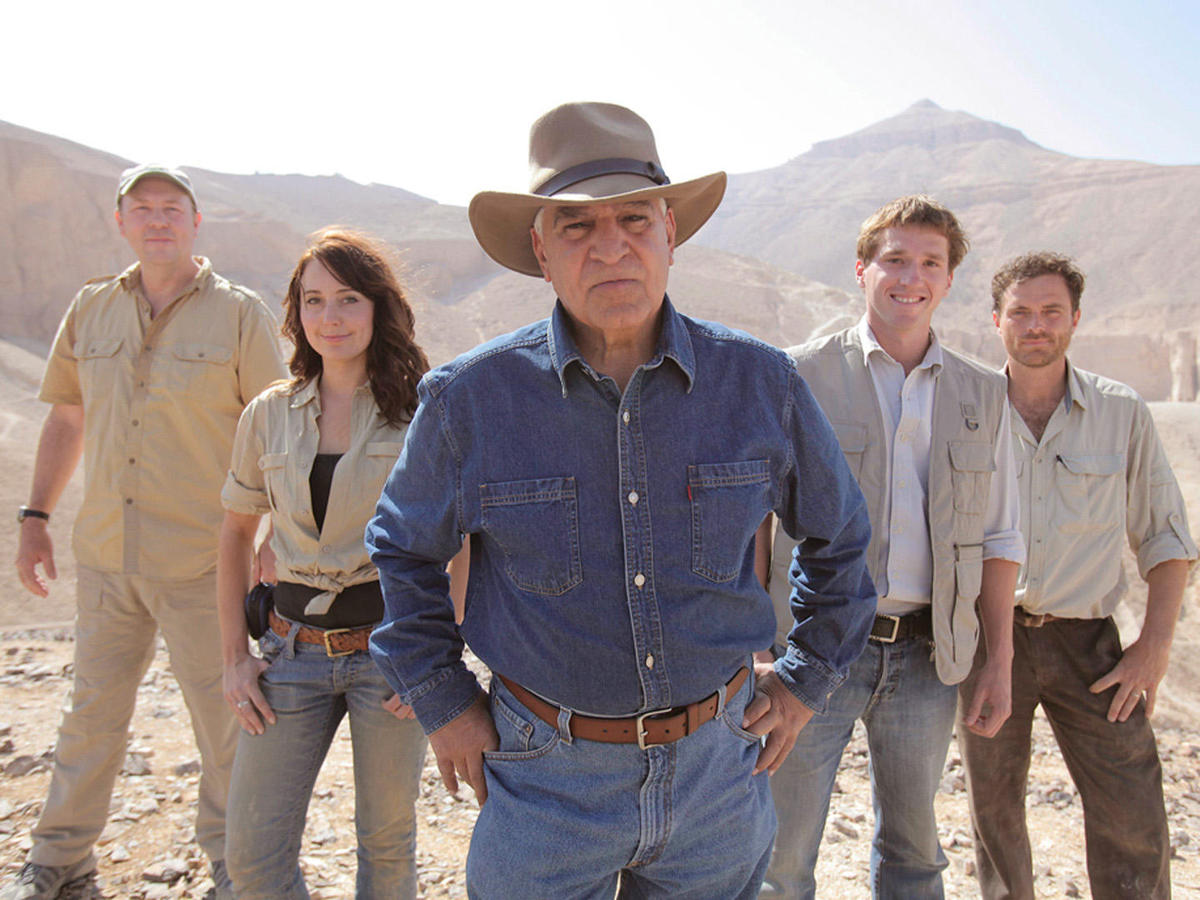
On February 6, 2011, Egypt’s Head of the Supreme Council for Antiquities stood atop the lotus-like Cairo Tower in a resplendent suit, complete with handkerchief, and delivered an impassioned defense of his boss, the beleaguered septuagenarian strongman Hosni Mubarak. “I think the President is fine,” he told a BBC interviewer. “The President would like to stay. And all of us would like him to stay.” He continued, “He made the whole world respect Egypt, and he was a kind man and a good man and I myself always respected this man.”
The BBC segment was not Hawass’s first public interview that week, nor would it be his last. The silver-haired sixty-four-year-old appeared often on television during the country’s epic eighteen-day uprising, performing his historic role as protector of Egypt’s formidable patrimony — much of it in the Egyptian Museum, just meters away from the clashes in Tahrir Square. After looters stormed the salmon-colored museum, Hawass played down accounts of damages in an interview with Al Jazeera, even as cameras panned over the considerable detritus in his midst. “They destroyed two mummies and opened one case,” he insisted.
Mubarak stepped down on February 11. In the weeks that followed, the list of missing antiquities grew to more than sixty irreplaceable objects — statues, amulets, fans, and vases. The libertarian energy in the city inspired Hawass’s own employees to picket against him. Assembling outside the council’s headquarters in the leafy Zamalek section of Cairo, they clamored for better pay — the average Egyptologist is paid the equivalent of seventy-five dollars per week, even as the tourist industry brings in billions — and accused him of all manner of cronyism and self-promotion. There was talk, too, of his notorious intimacy with the Mubaraks, not least Mubarak femme, Suzanne. By July, like the patriarch he had so ardently defended, Hawass was out of a job.
And yet Hawass remains probably the third-most-famous living Egyptian, after Mubarak and Omar Sharif. A living, breathing icon — a kind of human obelisk — he has rebranded the country’s archaeological marvels through blockbuster globetrotting exhibitions on King Tut and Cleopatra. With his Indiana Jones hat, his lispy voice laced with saliva (delight in hearing him say Hatshepsut), and heroically massive hips, Hawass unearths tombs and hurtles up and down modest-size pyramids, lending his occupation all the glamour and excitement of a game show. An ardent nationalist, he battles with the museums of the world over important Egyptian holdings. (“We own that stone,” he says of the stele from Rosetta.) He balks at Afrocentrists who argue that the ancient pharaohs were black. When Barack Obama came to Egypt to deliver his “I Heart Islam” speech in 2008, it was Hawass who showed him around the pyramids. Americans might know him best as the host of the television series Chasing Mummies on the History Channel. (The New York Times reported that he has received as much as $200,000 a year to be an Explorer in Residence for National Geographic.) A renaissance man, he has collaborated on a line of clothing inspired wholly by… himself.
Ursula Lindsey: Do you see any parallel between what’s happening now and any other time in Egyptian history?
Zahi Hawass: This all happened exactly 4,200 years ago. There was a king called Pepi II. He ruled Egypt when he was eight years old. When you rule for so long, there is deterioration. Actually Mubarak — the worst thing that he did was to stay thirty years. Power accumulates around you, whether you’re the ruler or the antiquities director. I used to meet Mubarak during the opening of the Islamic Museum or other sites. I saw an old man who had lost his memory, could not concentrate. Pepi II became an old man and the country became corrupt. An historian of the time, Ipuwer, wrote about the situation. He said he told the king what was happening to Egypt, that the situation was very bad, but the king never listened.
UL: But nobody could say this to Mubarak, right?
ZH: No, of course. There is one thing that I hope Egyptians will stop doing: bullshitting every leader or head of a ministry. What happened to Pepi II? Revolution happened. The poor became rich, the rich became poor. The lady that used to have to look in the water to see her face, now she has a mirror. They raped the pyramids. The farmer who used to go to the field with an axe, now he goes with a gun. Three people leave their homes in the morning, two come back in the evening.
UL: This is all his description of—
ZHL: The first social revolution of Egypt: exactly four thousand and two hundred years ago.
UL: Did you ever think that, when people said Mubarak was like a pharaoh, the comparison was historically accurate?
ZH: You know, I have to tell you, Egypt was ruled by pharaohs for five thousand years, until Mubarak. If Nasser hadn’t died, he would have stayed in office all his life. Same with Sadat. Mubarak is the one who tried to make a democracy. If he had resigned ten years ago, he might be a hero. But he didn’t. And look what happened.
This book appeared last week. [Holds up book.] You know German?
UL: No, I don’t.
ZH: It says: “Zahi Hawass was the last pharaoh of Egypt.”
UL: Oh, really?
ZH: In Italy, they call me the last pharaoh. They love me. This is how they introduce me on the TV.
UL: People everywhere identify Egyptology with you. Is it strange now to be a private citizen?
ZH: I have to tell you, I am still seen by every Egyptian — ask anyone in the street who the antiquities leader is. Last week, I was walking in the street — I don’t have cars or guards or anything, I take taxis and I sit in cafés and I go to the movies alone — and I came across a beggar. He’s dirty, you know, and he asks for money. He said [whimpering in imitation], “Dr. Zahi, I love you.” When he said this, I had tears in my eyes.
UL: When I was last in the States, your name came up with some relatives of mine who live in Oregon and really don’t know much about Egypt at all. They immediately recognized your name and said, “Oh yes! Zahi Hawass! We watch Chasing Mummies every week.”

ZH: If you go to Los Angeles and advertise that I’m giving a lecture with $25 tickets, and you have a space for 4,000 people, you will fill it in two weeks. I have a big name in America, and everywhere. For 14 years I was in charge of antiquities. I put Egypt on the top of the world. I trained young Egyptians; I said that Egypt has to be in charge of its antiquities, not foreigners, but we have to respect foreigners. I developed 24 museums. The King Tut exhibit was perhaps the best thing that ever happened to Egypt. It brought $103 million to the country. Before, people used to allow exhibits to travel to other museums for free. I said there is no free meal anymore! We have to bring money to Egypt to restore the country. You know, Ahmed Ezz from the National Democratic Party under Mubarak — he fought me in the parliament when I tried to change the antiquities laws. It was in the paper every day. He wanted antiquities to be sold in the streets and I said no. I fought him and I won.
I enforced the management and changed the faces of Pharaonic and Islamic archaeological sites. When I restored the Jewish synagogue, people thought I was crazy, that I would be killed. Someone said the money for the synagogue can be used to build a mosque. I said this is wrong. I went to the Egyptians and I told them that Jewish synagogues are a part of the history of Egypt. If you destroy this part of history, you destroy Egypt. And they accepted!
Because of what I built, Egyptian antiquities were saved from the revolution.
UL: The last time I saw you was to discuss your repatriation efforts. How much progress has been made on that front?
ZH: This fight to bring back artifacts to Egypt has made me lots of enemies. I was so strict and strong; I had five thousand pieces returned to Egypt. In the 1980s, I was trying to bring back five, big, unique artifacts, such as the bust of Nefertiti. Dietrich Wildung was in charge of the museum in Berlin, and he was a really difficult man. He tried to use the bust for his own glory. One day he took the head of Nefertiti in his hand in a taxi! That really made me upset. I decided that he doesn’t deserve to have this bust in Berlin. No! It belongs to Egypt. We studied the case and I found out that the bust was taken from Egypt illegally by Borchardt in 1912. I had an office with many unique Egyptians and some foreigner volunteers. Young ladies left their homes in America and England and came to help me in the fight for the truth. In 1987, the German ambassador came to meet the head of antiquities, Mohammad Abdul Qader, who told him we need the bust of Nefertiti back. The next day, the Egyptian government fired Mohammad Abdul Qader. But I wasn’t afraid of anything.

UL: People obviously have very strong feelings about you. Like you said, people come up to you on the street and tell you how much they respect what you’re doing. But they also attack you. Why do you think they have such strong feelings?
ZH: Since the revolution, you can hire people to say, Ursula is a crook! Ursula is a thief! Who can defend you? No one. If you’re famous, someone will write this. What happened during the revolution is that bad people began to come out of their holes and try to get the good people.
All my life, I was an archaeologist. I’ve never been a politician. When the revolution came, I was the only Egyptian official who went to the Cairo museum on January 28 and 29, the only Egyptian official who was in Tahrir Square.
UL: Actually, we would love to hear in detail what happened that evening.
ZH: Of course. I was sitting at home on the 28th and I heard on the TV about people entering the Cairo museum. I was so afraid that the museum would be robbed. At seven the next morning I got up and drove my car, by myself, to Tahrir Square. I was beautifully welcomed by the people. You know, I’m a person who is loved by the people in the streets. If you walk with me, you’ll find poor people who don’t know how to read or write but who will recognize me and ask to take a photograph with me. I really enjoy the love of the Egyptians. I have a fan club for children, and I receive letters from people all over the world who support me. In Tahrir, they received me and they said, “We saved the museum for you.” I found young people with their arms linked in front of the museum. I entered the museum and I found the army commanders inside. I said, “Are the mummies safe?” They said safe. “Are the King Tut artifacts safe?” Safe.
The people who broke into the Cairo museum came down by ropes, like in the movies. But it was dark and they fell on the display cases. Someone broke his leg, and the blood could be seen on the floor. This was good for us: They couldn’t see the gold room, King Tut’s room, the masterpieces. They were interested in two things: gold and red mercury. Red mercury is a legend that, in the mind of every Egyptian, is associated with mummies. If you cut the throat of the mummy, you can find red mercury, which allows you to cure people, summon the Jinn; you can do many things. Really, there is nothing called red mercury, but Egyptians can’t live with that, they can’t live without the idea of treasure. So they dig underneath their houses to find antiquities — to find red mercury.
UL: So what did the thieves get?
ZH: We found out that fifty-four objects were stolen. We are still missing twenty-eight small pieces and half of a statue. I was made minister of antiquities, then I resigned after two months. But they brought me back. When I came back, a man came to me with a case in his hand, which contained five statues stolen from the museum, from King Tut’s room.
When you make a new government, you want to have faces that are loved by the people, and I was one of those faces. The former prime minister, Ahmed Shafik, was a good friend of mine, and he knew that if he asked me to be the minister of culture I would say no. So he made a new ministry for me, the Ministry of Antiquities. How could I say no? I was so afraid, because I have never been a politician. The only thing that I did with Mubarak was to make the children’s museum. Ursula, if you go to this museum you will see that it is the best thing in Egypt. It is unique, it is not to be repeated. But because of that this lady from the New York Times says that Zahi Hawass is from the old regime. How?! I’m from Egypt! I’m for Egypt! I was always wearing my jeans and my hat and protect the Egyptian antiquities.
UL: You had some minor insurrections within the ministry.
ZH: There are two crooks in the ministry who went to a reporter who hates himself, hates success, saying that I stole objects from the King Tut collection, that I took $200,000 from National Geographic. And so there had to be an investigation. One of these crooks really is a thief: He stole antiquities from Sakkara. When the revolution came, they wrote seventeen accusations against me. Anything that I did for Egypt, they wrote against it. I had to defend myself for one and a half years, gathering evidence, until I proved that not one single accusation was correct. And I used to cry. I’m a strong man, I never cry in front of anyone. This week, all of the charges were completely dismissed. Completely.
UL: What is your sense of the current political situation in terms of tourism?
ZH: Two things should happen. Number one, the president should concentrate on the return of security with a strong hand. What’s happening now is bad. You can do anything in the streets. Antiquities sites are being disturbed. If you return security to Egypt, all of those crooks who make demonstrations — you know, people are demonstrating, they’re not working. No one is working. How are we going to eat? I don’t understand! We need to tell people: Egypt is back. The magic is back.
UL: The demonstrations are obviously destabilizing, but it’s hard to tell people not to demonstrate.
ZH: But you have to work. And people have to understand what’s meant by a demonstration. When I was a student at the University of Pennsylvania, Israel killed people in Lebanon. I wanted to make a demonstration, so I went to the police and told them that a group of Arabs, Egyptians, wanted to make a demonstration. They said what will you say, what streets will you walk? I said so and so. That’s a demonstration. Not to insult people, not to say that this guy is a crook, not to destroy things, and not to stop traffic.
UL: I think that people feel like there aren’t enough opportunities, that’s why they’re so —
ZH: There is no way that a lazy man or a dishonest man can have an opportunity. You have to work to deserve a good opportunity. Those people don’t understand. They think that by attacking, screaming, lying, and demonstrating, they’ll get the opportunity. This is wrong.
UL: Tell us about your day.
ZH: I have the best time. I always look to the future. I used to be strong. I used to stand against the government. I never talked about this in the press: I stopped the Ring Road that was threatening the pyramids. I stood against the government! People were saying that I was going to be fired. I said I don’t care. I left antiquities for one year in 1994 because of the jealousy of the head of antiquities. He ruined me. He was so weak and dishonest. I left Egypt and went to teach at UCLA, but I came back strong. I stood against the government when I found out that the Western Road that goes from Cairo to Aswan was going to cross behind the Temple of City in Ibidis. I stopped it! I never said yes to anything that would destroy antiquities, which is why many people were happy that I left. But after the revolution, everyone began to ask, Where is Zahi Hawass? We need him back. We need him to save us. And this why I’m not going to answer people who say things against me; the books that I have written will remain, they are taller than these idiots.

UL: You were talking about your schedule —
ZH: I come here at 9 or 10 in the morning, take my coffee, and I begin to write articles. I receive letters from people all over the world about my articles in Asharq Alawsat. I will start writing for Al-Ahram newspaper next week. I write and I meet people. My office is like a museum: all the prizes, all the photographs with people. Everything. At 3:30, I go to the gym.
UL: Do you run? Do you lift weights?
ZH: Yes. I have half an hour of running and half an hour of training. And I have a trainer. I go home tired and happy. I watch black-and-white TV for one hour, and after that I go to have dinner with people I love. I’m not forced to have official dinners; I have dinner with my friends.
UL: What are some of the things you’re most proud of doing as a head of antiquities?
ZH: I think if people say that there is a legend of Zahi Hawass — my legend — it is educating young people. The pyramids were my life. I always wanted to change the pyramids from a zoo into an open-air museum. I proposed that all of the cars in the desert go from Fayoum Road into the desert area to park. The souvenir vendors that attack tourists would have to remain in the desert. All of the camels and horses would stay in the desert. After you park, you can take a camel or a horse and walk in the desert, away from the pyramids — the pyramids would still be in the background. Then you’d enter the visitor center. And after the visitor center will be a parking lot for electric cars. You take the electric car to the second pyramid, and you walk down to the Sphinx, to the Great Pyramid. No one bothers you.
UL: What’s the situation with this project?
ZH: Camel and horse drivers are like the mafia of Egypt. They hated this project. They are really mafia, they can kill me. They are — some of them are — not good people. They don’t care about pyramids. They care about how much money they getting. I tried to tell them I will bring all the tourist buses to them, in the desert. In this business, the strongest camel people and vendors get more business than the young people. In my system, everyone would be equal; you’d get a ticket with the number of a horse or camel.
When the revolution came, the camel and horse drivers thought it was the right time to get rid of me. They made signs against me, attacking me. You have to give people jobs to stop them from saying such things about you. Now, the guy who took my place, to save himself, he gave jobs to 10,000 people. If you go to the pyramids, there are 10,000 inspectors. You only need 500.
UL: There was so much going on in the last two years, so much confusion and so many attacks —
ZH: Now I am writing a book. This book, Ursula, is telling you what I did for the antiquities of Egypt. I was honest all my life, Ursula, I was strong. I never — you know, when I hear things about me in the paper, you know when I go to bed, Ursula [pretends to snore]… I snore because I know that nothing will happen to me because I never did anything wrong.